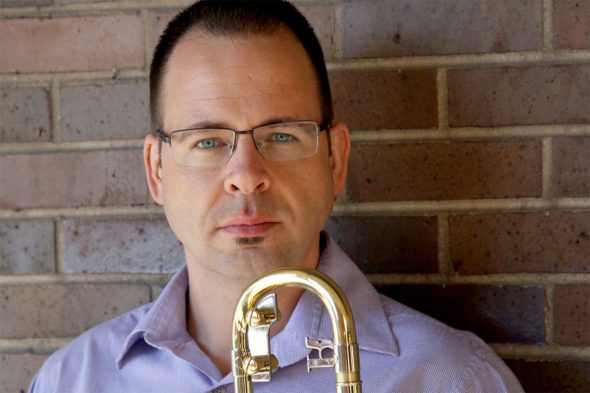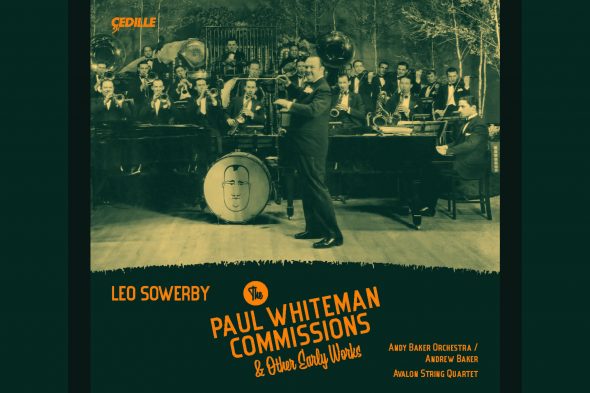UIC music professor’s classical album spotlights forgotten works by composer with Chicago ties
When Andy Baker, clinical assistant professor at the University of Illinois Chicago, came up with the idea to record Leo Sowerby’s early work, he never realized it would require him to undertake the expert sleuthing of a detective.
While Sowerby was a composer well known for his mid-20th century church music when he was based in Chicago’s St. James Cathedral, Baker was drawn to Sowerby’s unrecorded classical pieces commissioned during the 1920s to be performed by a jazz ensemble.
With partial funding from UIC’s Awards for Creative Activity program, the Chicago bandleader-trombonist got to work and put together the Andy Baker Orchestra, which included several colleagues and alumni from the UIC School of Music, and recorded Sowerby’s “Synconata” and his Symphony for Jazz Orchestra, “Monotony.”
The resulting album, “Leo Sowerby: Paul Whiteman Commissions and Other Early Works,” was recently released by Chicago-based Cedille Records — which also helped fund the endeavor — to glowing reviews, including debuting at No. 3 on the Billboard Traditional Albums chart and No. 10 on the Amazon Classical list.
“Sowerby is an important American composer, and these are major works from his early career that have never been recorded,” Baker said. “It was a bit of a detective job to assemble these scores and parts and figure out what was going on because the music had been played nearly a hundred years ago and then put into a box.”
The pieces were originally commissioned by bandleader Paul Whiteman to create a repertoire for his “Revolutionary Concerts” series whose commissions at the same time funded George Gershwin’s “Rhapsody in Blue.” Both Gershwin’s classic and Synconata were written in 1924, and Sowerby’s four-movement Symphony for Jazz Orchestra, “Monotony,” followed in 1925.
After the New York premiere of “Synconata,” which Baker notes one critic hailed as a greater piece than “Rhapsody in Blue,” the larger “Monotony” followed with its world premiere in Chicago.
The impetus to unearth these forgotten works began for Baker soon after he joined UIC in 2012 and began to discuss Sowerby with Francis Crociata, president of the Sowerby Foundation, to whom he is related by marriage. While Sowerby was referred to as the “Dean of American church music,” had won a Pulitzer Prize for music in 1946, and whose music was often played by the Chicago Symphony Orchestra, Baker’s interest was in Sowerby’s more esoteric jazz and classical connection.
Baker, born and raised in London, appeared on recordings and television shows by the age of 18 and toured Europe with the Ray Gelato Giants before relocating to Chicago, where he joined the Jon Faddis’ Chicago Jazz Ensemble from 2006–2012 and has been a core member of Fulcrum Point New Music Project since 2010. In the early 2000s, Baker joined the faculties of Northwestern University and Elmhurst College and co-founded the bands BakerzMillion and the New Standard Jazz Orchestra. Returning to school to pursue his interests in education and composition, Baker earned a master’s degree from DePaul University and later joined UIC’s faculty full time.
Once Baker decided on the project, he had to try and track down the music scores — not an easy task because of the lack of published editions, including a final performing edition.
“Neither of these works had ever been recorded or professionally performed outside of the Whiteman ensemble,” Baker said. “A lot of the decisions that I had to make were about how much jazz phrasing would be involved, especially in terms of swing rhythms and things that were idiomatic.”
He managed to track down scores for “Synconata” and “Monotony” at Northwestern University that listed parts that were often in conflict with the scores. Sowerby later made a “Synconata” version for two pianos.
While the “Synconata” orchestral version had not been professionally recorded, a student performance was recorded at Northwestern University, but this version lacked a key first trumpet because the student who was to play on the piece was involved in an automobile accident on the way to the performance, Baker found out.
“There were handwritten scores and handwritten parts from the original performances, but there were lots of changes indicated in the scores and different kinds of changes in the parts in the performance,” Baker said. “I just tried to piece the whole thing together and figure out how to make the music work and get everything to line up and make sense and then see how we could record it.”
Similarly, he had problems finding a finished performing score for Symphony for Jazz Orchestra, “Monotony.” The original conception of this symphony included set designs that called for a 6-foot-tall metronome ticking on the stage as the music played. Other set designs included by Sowerby called for costumes, bells, and women holding up placards with the names of the four movements and walking across the stage as though announcing different rounds of a boxing match. Baker discarded all of these instructions.
The piece was also conceived having a steady pulse from the beginning to end for the duration of the piece, hence its name, “Monotony.”
“The idea of having something with a steady pulse for 20 minutes is just not musically interesting. It needs to breathe,” Baker said. “Upon looking at the score and thinking about the music, that one went out the window straight away.”
In January 2020 during UIC’s winter break and before COVID-19 locked down music and recording halls, he put together the Andy Baker Orchestra and recorded the album, which included colleagues from the UIC School of Theatre and Music: Ivana Bukvich, Kelly Langenberg, John Gaudette and Reed Capshaw. He also brought in UIC students Ephraim Champion and Vicki Beck to play on the recording.
While the original aim was to round out the album with other unrecorded Sowerby works for large ensembles, those plans had to be scrapped when COVID-19 prevented the orchestra — which ranged from 38 to about 45 musicians — to gather safely. Instead, the remainder of the album is made up of smaller string pieces performed by a quartet that had been in residence at Northern Illinois University.
With the success of this album, Baker is considering recording other pieces with his orchestra when it’s safe to do so.
“I’m delighted it’s gotten such great reviews; it’s thrilling. You never know how something’s going to land,” Baker said.
Purchase or stream Leo Sowerby: Paul Whiteman Commissions and Other Early Works.


